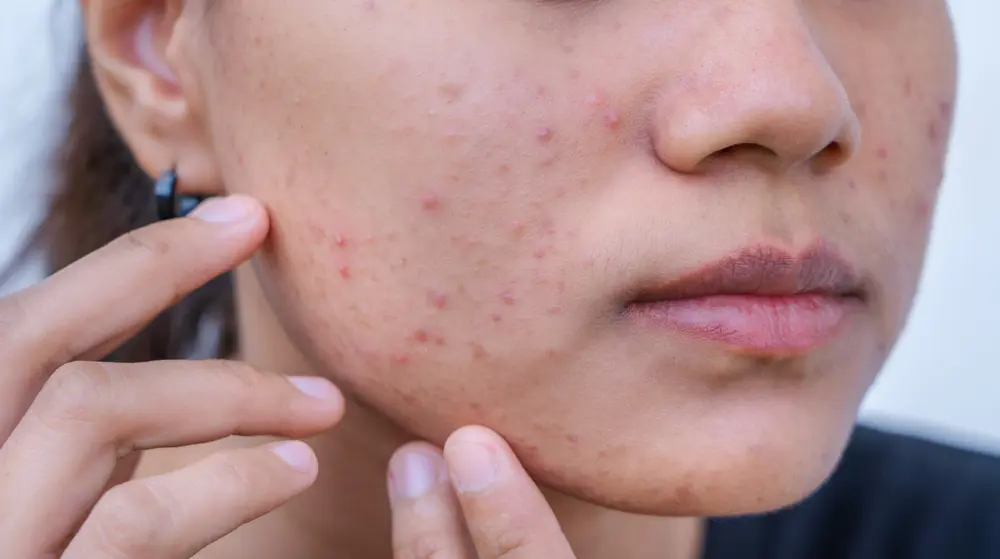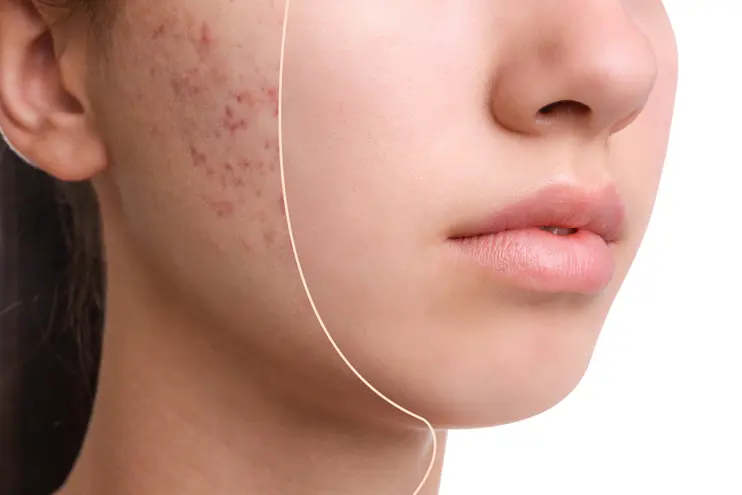Acne and Scars
- Home
- Acne and Scars
Our Doctor

Dr. Rahul Sheshgiri
Dermatologist & Cosmetic Doctor
Acne and Scars

Introduction
Acne and scars are common skin concerns that can affect individuals of all ages and skin types. From pesky pimples to stubborn scars, dealing with acne-related issues can be frustrating and challenging. However, with the right knowledge and treatment approach, you can effectively manage acne breakouts and minimize the appearance of scars for clearer, smoother skin. In this comprehensive guide, we’ll explore the causes of acne and scars, effective treatment options, preventative measures, and skincare tips to help you achieve a healthier complexion and regain your confidence.
Understanding Acne
Acne is a skin condition characterized by the formation of pimples, blackheads, whiteheads, and cysts on the face, neck, chest, shoulders, and back. It occurs when hair follicles become clogged with oil, dead skin cells, and bacteria, leading to inflammation and the formation of blemishes.
Several factors can contribute to the development of acne, including hormonal changes, genetics, lifestyle factors, and skincare habits. Common triggers of acne breakouts include hormonal fluctuations during puberty or menstruation, excessive oil production, poor dietary choices, stress, and certain medications or skincare products.
Effective Treatment Options for Acne
Topical Treatments: Over-the-counter and prescription topical treatments containing ingredients such as benzoyl peroxide, salicylic acid, retinoids, and antibiotics can help reduce inflammation, unclog pores, and kill acne-causing bacteria.
Oral Medications: In severe cases of acne, oral medications such as oral contraceptives, antibiotics, isotretinoin (Accutane), and hormonal treatments may be prescribed by a dermatologist to help control breakouts and prevent scarring.
Professional Treatments: Dermatological procedures such as chemical peels, microdermabrasion, laser therapy, and light therapy can help reduce acne lesions, improve skin texture, and promote collagen production for smoother, clearer skin.
Understanding Acne Scars

Acne scars are the result of tissue damage caused by inflammatory acne lesions, such as papules, pustules, and cysts. When acne lesions penetrate deep into the skin, they can destroy collagen and elastin fibers, leading to depressed or raised scars that alter the texture and appearance of the skin.
There are several types of acne scars, including
- Atrophic Scars: Depressed scars that appear as pits or indentations in the skin.
- Hypertrophic Scars: Raised scars that form when the body produces too much collagen during the healing process.
- Keloid Scars: Thick, raised scars that extend beyond the boundaries of the original wound.
Effective Treatment Options for Acne Scars
Dermal Fillers: Injectable dermal fillers containing hyaluronic acid or collagen can help plump and smooth depressed acne scars, reducing their appearance and improving skin texture.
Microneedling: Microneedling, also known as collagen induction therapy, involves the use of a device with fine needles to create micro-injuries in the skin, stimulating collagen production and promoting the healing of acne scars.
Chemical Peels: Chemical peels use exfoliating agents such as alpha hydroxy acids (AHAs), beta hydroxy acids (BHAs), and trichloroacetic acid (TCA) to remove the outermost layers of the skin, revealing smoother, more even-toned skin underneath.
Laser Therapy: Laser treatments such as fractional laser resurfacing, intense pulsed light (IPL) therapy, and non-ablative laser therapy can help remodel collagen, improve skin texture, and reduce the appearance of acne scars.
Preventative Measures and Skincare Tips
Maintain a Consistent Skincare Routine: Cleanse your skin twice daily with a gentle cleanser, use non-comedogenic skincare products, and moisturize regularly to keep your skin hydrated and balanced.
Avoid Picking or Squeezing Acne Lesions: Picking or squeezing acne lesions can worsen inflammation, increase the risk of infection, and lead to the formation of scars. Instead, use spot treatments or consult a dermatologist for professional extraction.
Protect Your Skin from the Sun: Sun exposure can worsen acne scars and cause hyperpigmentation, so it’s essential to wear sunscreen with SPF 30 or higher daily and avoid prolonged sun exposure.
Eat a Healthy Diet: Incorporate plenty of fruits, vegetables, lean proteins, and whole grains into your diet, and limit your intake of processed foods, sugary snacks, and greasy foods that can exacerbate acne breakouts.
Conclusion

Acne and scars can be challenging to deal with, but with the right knowledge and treatment approach, you can achieve clearer, smoother skin and regain your confidence. By understanding the causes of acne and scars, implementing effective treatment options, and following preventative measures and skincare tips, you can take control of your skin health and achieve the complexion you’ve always wanted. If you’re struggling with acne or acne scars, consult a dermatologist or skincare professional for personalized treatment recommendations and guidance on achieving your skincare goals. With patience, consistency, and the right treatment plan, you can conquer acne and scars and enjoy healthier, more radiant skin.
What People Says!
Hear from our delighted clients as they share their experiences and stories of transformation. Your trust inspires us to keep delivering excellence!



